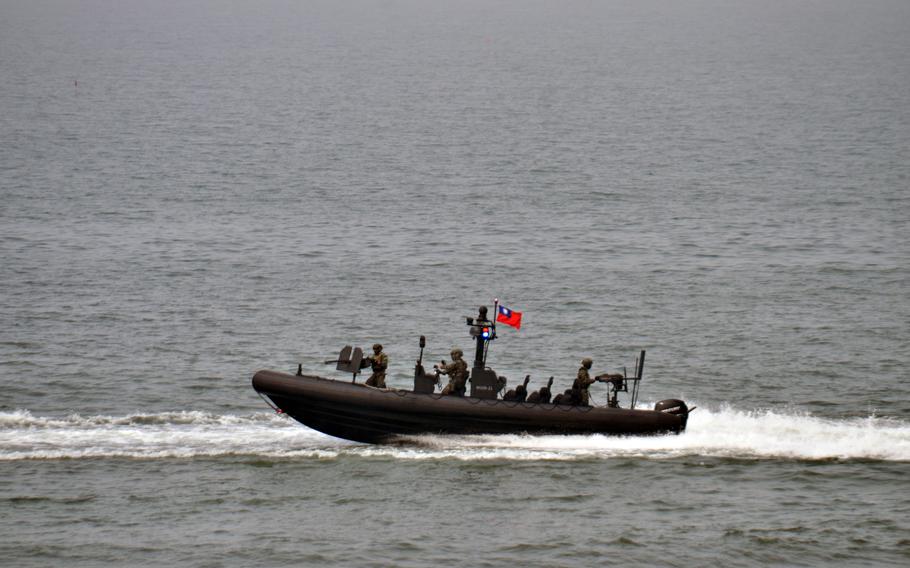
Taiwanese troops patrol the southern end of the Taiwan Strait, Jan. 12, 2023. (Seth Robson/Stars and Stripes)
China plans to inspect cargo ships and other vessels during a three-day “special joint patrol” of the Taiwan Strait announced Wednesday ahead of the Taiwanese leader’s meeting with House Speaker Kevin McCarthy.
Beijing launched the patrol just hours before Taiwan President Tsai Ing-wen was scheduled to meet McCarthy in California, according to Chinese state media CCTV.com.
Taipei immediately protested the announcement, which it said includes “on-site inspections” of cargo ships. It advised shipping companies to refuse boarding or inspection and alert the Taiwanese coast guard, according to a Wednesday statement from the island’s Ministry of Transportation and Communications.
China’s Fujian Maritime Safety Administration announced additional details about the three-day patrol via Chinese social media site WeChat, Reuters reported Thursday.
China initially announced the patrols as Tsai was enroute to Simi Valley, Calif., the last scheduled stop on a trip to Guatemala and Belize, two Central American countries among 13 nations that officially recognize Taiwan as a sovereign state.
Tsai and McCarthy, during a press conference at the Ronald Reagan Presidential Library & Museum, lauded the U.S.-Taiwan relationship.
“The friendship between the people of Taiwan and America is a matter of profound importance to the free world and it is critical to maintain economic freedom, peace and stability,” McCarthy said. “We will honor our obligations and reiterate our commitment to our shared values behind which all Americans are united.”
While the two carefully avoided mentioning Beijing’s aspirations of reunification, Tsai inched closer to the topic.
“It is no secret that today the peace that we have maintained and the democracy which we have worked hard to build are facing unprecedented challenges,” she said. “We once again find ourselves in a world where democracy is under threat and the urgency of keeping the beacon of freedom shining cannot be understated.”
Beijing considers self-governing Taiwan a breakaway province that must be reunited with the mainland, by force if necessary.
The meeting is likely to trigger a “show of resolve” from Beijing intended to discourage U.S. acknowledgement of Taiwanese independence, something that will feed a “vicious circle of reaction” between the U.S. and China, said Michael Swaine, senior researcher for the bipartisan think-tank Quincy Institute for Responsible Statecraft, in an email.
Beijing again protested the meeting, calling the “Taiwan question” the “core of China’s core interests and the first red line that must not be crossed in China-U.S relations,” according to a Thursday statement from China’s Foreign Ministry.
China further promised to take “strong and resolute measures” to defend its sovereignty and territory and said Taiwanese independence and peace within the Taiwan Strait are “as irreconcilable as fire and water.”
The situation echoes former House Speaker Nancy Pelosi’s visit to Taipei in August, which China responded to with a weeklong military exercise around Taiwan that effectively blockaded the island and included live-fire drills and ballistic missile launches.
Since then, China has almost daily and without notice sent large numbers of aircraft and warships across the 110-mile-wide strait.